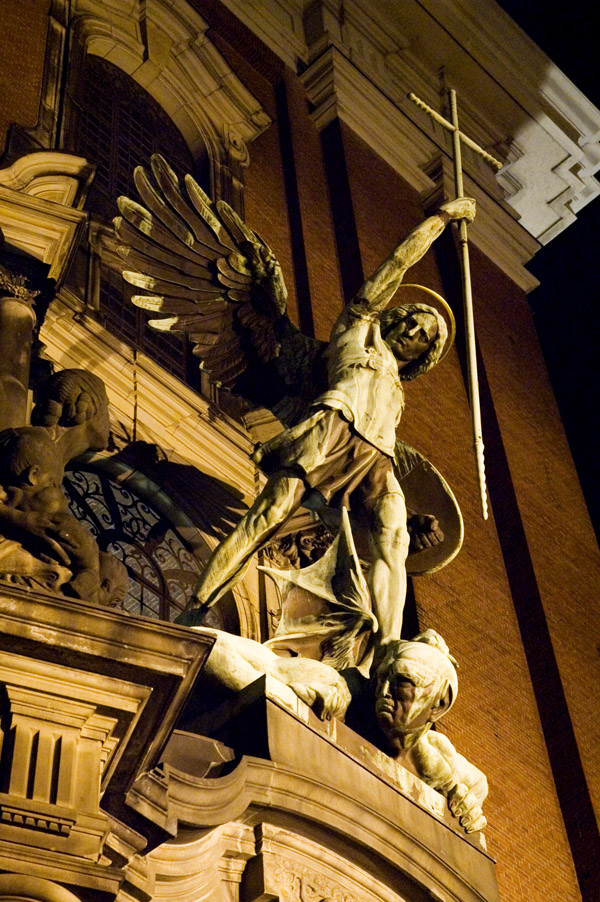As many of you know, I am planning to join the Roman Catholic Church, and am taking RCIA (
Rite of Catholic Initiation for Adults) classes once a week at
St. Rita church here in Alexandria. I know -- questions arise - and believe me that I am working through them myself. But here are a list of Frequently Asked Questions, and some preliminary responses. I suspect I'll be writing more about this topic in the future, and what follows is far from the summation of my thoughts on the subject. But please read on for an appetizer.
1.
Why are you rejecting Protestant/ELCA/Evangelical/Charismatic Christianity? I'm not. I grew up as an Evangelical Lutheran Christian, and later migrated to a more non-denominational and Charismatic Protestant Christianity. I can personally attest that God is moving in a powerful way though many of these churches. And guess what? There is good news. I can be a Catholic
without ceasing to be an Evangelical and a Charismatic - I am "Evangelical," in emphasizing the need for a personal relationship with Jesus Christ, and the need to be "born again" in his image, and an emphasis on spreading the Gospel, in both word and deed. "Charismatic" in pursuing and embracing real manifestations of the Gifts of the Holy Spirit, including prophesy, wisdom, knowledge, discernment, administration, tongues, interpretation of tongues, teaching, and so on. Many Catholics describe themselves as Evangelicals in the former sense, and of course the Charismatic Catholics have been around for a few decades now. So I do not reject my spiritual past. I reaffirm my desire for an Evangelical and Charismatic walk with Christ, in addition to integrating the contemplative beauty of the millenia-old Catholic Liturgy and Sacraments. In many ways I feel as though I am adding to my Christian faith by joining the Roman Catholic Church, not subtracting from it. EC and I love
Church at the Gate,
New Life Church,
Power Invasion,
Pathways Church -- how could we ever say we reject these churches? Never. At my Grandma Nelson's funeral last winter, I talked about the need for us, the grandchildren, to carry on the spiritual heritage Grandma Nelson helped pass to us - a deposit of faith rooted in the Bible, prayer and worship. I reaffirm that statement, even (and especially) as I join the Roman Catholic Church, an indisputabley significant piece of Christ's Body on earth.
2. What about all that Catholic-bashing you used to revel in? Many of my thoughts and statements about Catholic Christianity were repulsive and, most of all, ignorant. I've had to repent of backbighting and critical thoughts/words against Christians of all stripes. That I will call myself a Catholic Christian by next year is proof that the God we serve has an ironic sense of humor.
3. What about reverencing Mary and Saints, Purgatory and other "creative" theological concepts? They are not so creative as they initially seem. Even if you disagree with many of the concepts, you have to recognize that many of them are as old as any in Christianity, dating to the earliest days of the Church in the decades and centuries after the Apostles. Rumors swirl in Protestant communitites about "what the Catholic Church teaches". I recommend reading the Church's Catechism (a guide for clergy in teaching their local parishes) and the writings of the current
Pope Bendict. Peter Kreeft (see sidebar),
George Weigel and
Scott Hahn are also exceptionally clear and reputaple sources. It's always better to hear from the horse's mouth than to "Google it" and hope for the best.
4. Are you really ready to submit to the Pope, and all that rigid hierarchy? It is true that the Roman Catholic Church is not a democracy. Submission to a Church has always been something I thought I would chafe under. However, I have to ask: "What am I actually submitting to?" The best way to accomplish this, again, is to go to the horse's mouth: the Catechism, the Pope (derived from the Italian word for father, "papa"). Many non-Catholic Christians looking for a Mary-worshipping, indulgence-peddling Pope are sorely disappointed by the current Pope Benedict, because he embodies Christo-centric Christianity (is there any other legitimate kind?). For a dose, check out his first book as Pope,
Jesus of Nazerath, and his first encyclical, "
God is Love."
5. Why are you embracing mindless, repetitive rituals? Don't you HATE the Liturgy? I remember disliking liturgy growing up. It seemed just that -- repetitive. But I've found the full Liturgy of the Catholic Church to be an enormously rich mode of worship. "Ritual" is a word that needs to be saved -- at the current rate, it could be disparaged out of existence in many Christian circles. Ritual is as old as the Body of Christ -- even older, as Jewish life has been fused with ritual-as-worship since its inception thousands of years ago. Surely there is a balance between ritual and the more spontateous acts of worship and prayer? I think so.
6. Is this because of Ted Haggard? No, we love New Life Church, and Pastor Ted - who clearly has some sin issues to work through in his life. God has used New Life in a powerful way, and is continuing to do so.
7. Is this because you are being pressured by EC's family/EC herself? Nope. In fact, EC didn't even know I was even considering this until about two months before telling other family and friends. The decision was made out of personal, private, secret prayer. I can't emphasize that enough.
8. You must be becoming a Catholic because you want family unity. Family unity will be a consequence, but is not the cause of me becoming Catholic. Don't confuse an effect with a cause.
9. Do you think ALL Christians should become Catholic? Only if God is leading you to do so - and this is discerned in prayer. If not, I wouldn't recommend it. Becoming Catholic for any flippant reason, even for the sake of marrying someone who is Catholic, is dangerous if it is not done in obedience to God. Obedience in all things, and above all things, folks.
10. Ok, so you are becoming a Catholic Christian. What do you have in common anymore with me, an Evangelical/Charismatic/Pentecostal/Protestant/Non-denominational Christian? We are priveledged to be members of the Body of Christ. We are brothers and sisters in Christ. We have the same Head, and the same Bridegroom: Jesus Christ! What an incredible, unbreakable bond! Therefore: the only thing that would fully sever us from each would be if we choose to reject Christ, God made Flesh -- our very Head in Common. Theological differences will remain, and I would encourage debates amongst believers, so long as they are done in love with a common agenda for apprehending the Truth. Otherwise - are we to quarrel about opinions? NO. Body of Christ, pray for Unity!
I'd love to see comments posted, but if you don't feel comfortable doing that, feel free to e-mail me
here.
BC
 As our plane descended last week, the South Dakota countryside looked like a white sheet of unlined paper – unscratched and inviting. There were no red lines of taillights; no cars trying to squeeze into a stream of speeding drivers. It was nice. We exited the airport and started to drive. And as we drove, for the first time in six months, my knuckles were not white. In the fading sun the snow on the hills turned pink and grey, and I reflected on the goodness of appreciating a place.
As our plane descended last week, the South Dakota countryside looked like a white sheet of unlined paper – unscratched and inviting. There were no red lines of taillights; no cars trying to squeeze into a stream of speeding drivers. It was nice. We exited the airport and started to drive. And as we drove, for the first time in six months, my knuckles were not white. In the fading sun the snow on the hills turned pink and grey, and I reflected on the goodness of appreciating a place. 

















